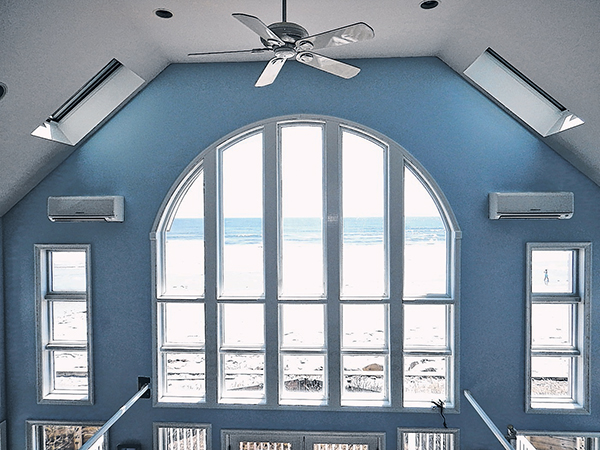 What is a heat pump, and why are they so popular?
What is a heat pump, and why are they so popular?
Libby: The technical name for a heat pump is a Reverse Cycle Air Conditioner. Essentially, they are air conditioners that can work in reverse to perform a heating function.
Most people in Maine want an energy-efficient way to heat their homes. They get that when they have a heat pump installed, and because of the technology, they also get a very efficient air conditioner.
Heat pumps are so popular because people in colder climates can now actually heat their homes with them. The older heat pumps stopped producing heat once we got below freezing outside.
How are today’s heat pumps different?
Libby: In colder climates like Maine’s, heat pumps now effectively produce heat in temperatures as low as negative 15 degrees. This wasn’t true of older models.
Today’s heat pumps incorporate a number of thermistors to measure the indoor temperature, the outdoor temperature and the temperature at several locations inside the heat pump.
Using this information, they use an inverter to control the speed of the fans and the compressor to adjust the heat output and to maintain optimum room temperature. The performance has also been improved with larger coils and different refrigerant.
Other than the name, they are nothing like their predecessors.
Can a heat pump completely replace my current heating system?
Libby: Yes, with proper system design. Every home, no matter how well or poorly insulated, requires a certain amount of heat to keep it warm during Maine’s harsh winters. That heat is measured in British Thermal Units (BTUs).
The most efficient heat pumps deliver 100 percent of their heating capacity at 5 degrees. They get less efficient and deliver less heat (BTUs) at lower temperatures.
If we can do some fairly simple load calculations to determine how many BTUs are needed for your home, and match that with a heat pump system that will deliver that amount when it gets below zero, we can completely heat your home. It is no different than using a boiler or a furnace, except you are not burning fossil fuels.
Can a heat pump work in any home?
Libby: The perfect home for a heat pump is one big room with super-insulated walls, and triple-pane windows, because it can be heated with one heat pump, maintain a very even temperature, and enjoy low utility costs for the life of the home.
The heat pump and added insulation will pay for themselves in a matter of years. My house is an 1830s farmhouse and it is heated with heat pumps. It has had windows replaced and some insulation work, but nothing I would consider “energy efficient.” It is 2,800 square feet and has 10 smaller rooms.
The key thing is meeting the BTU load of the house with the BTU output of the heat pumps. We have not burned fossil fuels to heat it for several years.
How does the cost to operate a heat pump compare with other heating options?
Libby: Efficiency Maine has a great “Annual Heating Cost Comparison Chart” at efficiencymaine.com. It shows that a heat pump costs slightly more to operate than geothermal or a small natural gas space heater, but slightly less to operate than a natural gas boiler or furnace.
Our experience is, customers will save 50 percent to 60 percent when compared to oil or propane. Feedback we are getting from our customers indicates that a simple heat pump installation will pay for itself in two heating seasons. That’s while they are keeping their thermostats at 70 degrees, instead of 63 degrees.
What should a homeowner/buyer look for in a contractor?
Libby: Look for someone they trust. If someone doesn’t answer the phone, or takes a long time getting back to you, that should be a warning.
The installation is only a few hours of your entire relationship with the installer and your heat pump. The key questions to ask include:
- How long have you been installing heat pumps?
- Do you service the heat pumps, or do you only install them?
- Do you have liability insurance, and can you provide me with a certificate?
Ask for references – and call them. Energy Star (energy star.gov) has a great “10 tips for hiring a heating and cooling contractor.” We give that pamphlet to our customers.
This interview originally appeared In the SunriseGuide monthly newsletter and on www.thesunriseguide.com.
Copy the Story LinkSend questions/comments to the editors.



Success. Please wait for the page to reload. If the page does not reload within 5 seconds, please refresh the page.
Enter your email and password to access comments.
Hi, to comment on stories you must . This profile is in addition to your subscription and website login.
Already have a commenting profile? .
Invalid username/password.
Please check your email to confirm and complete your registration.
Only subscribers are eligible to post comments. Please subscribe or login first for digital access. Here’s why.
Use the form below to reset your password. When you've submitted your account email, we will send an email with a reset code.